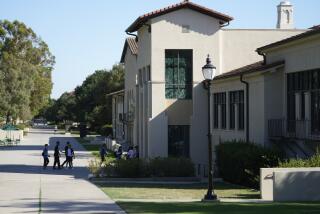Johns Hopkins Plans to Sell Holdings in Tobacco Firms
- Share via
BALTIMORE — Johns Hopkins University, home of one of the nation’s most prestigious medical schools, decided Friday to sell its holdings in tobacco companies, saying the investments undermine its effort to fight cancer.
“The holding of tobacco stocks is incompatible with the university’s mission to disseminate information on the treatment and prevention of disease and illness,” the trustees said in a statement after the unanimous vote.
Hopkins will sell stocks and bonds valued at $5.3 million from four companies with tobacco holdings, university spokesman Dennis O’Shea said. He declined to identify the companies, saying the aim was not to penalize them.
Carl A. Latkin, a postdoctoral student on a faculty-student committee that brought the issue before the trustees last April, has said that about 1.5% of the university’s $700-million portfolio--or more than $10 million--is in companies that sell tobacco products.
When asked to explain the discrepancy between his and O’Shea’s figures, Latkin said Friday that the portfolio’s value is constantly shifting.
Only a handful of other U.S. campuses have shunned tobacco company stocks, including Harvard and City University of New York.
California’s health chief last month urged two large pension funds and several universities, including Stanford and the University of California, to unload their tobacco company holdings. The holdings are worth $546 million.
The Tobacco Institute had no comment on the decision by Johns Hopkins, said Brennan Dawson, spokeswoman for the industry’s leading trade group.
Philip Morris Cos., which was said to be one of the companies targeted by the university, had lobbied against the move.
In a statement Friday, the tobacco giant said, “Philip Morris believes that investment decisions by fiduciaries should reflect the judgment of a prudent investor and should not be based on issues of social policy.”
Philip Morris stock returned an average of 30% to shareholders in the past 10 years, the company noted.
The vote by 49 Hopkins trustees came hours before William C. Richardson was installed as university president. Richardson, a health policy expert, was on a special trustee subcommittee that recommended divestment.
“It was incompatible . . . for the school to be making profits on the sale of tobacco given the fact that smoking, be it smoking or passive smoke, is the greatest single preventable cause of death, disability and disease today,” said Dr. Al Sommer, dean of the School of Hygiene and Public Health.
About 1,000 people die daily from the effects of tobacco smoke, Sommer said.
In a sign of Philip Morris’ concern over the Hopkins move, Chief Executive and Chairman Maxwell Hamish traveled to Baltimore to argue the company’s case before the trustee subcommittee.
More to Read
Sign up for Essential California
The most important California stories and recommendations in your inbox every morning.
You may occasionally receive promotional content from the Los Angeles Times.










